“AI will not replace doctors but instead will augment them, enabling physicians to practice better medicine with greater accuracy and increased efficiency.”
– Benjamin Bell
In recent years, AI has touched and transformed endless industries. Some jobs were wonderfully replaced, while some have left the world in both awe and shock as to how the pace of AI is conquering the world, one sector at a time.
As we dig deeper and think broader of the use cases and impact of AI, the role of AI in healthcare cannot be ignored.
AI Technology in the Healthcare Industry
AI in the healthcare sector has witnessed a revolutionary transformation with the integration of artificial intelligence (AI) technologies. These advancements have not only improved the efficiency of healthcare delivery but also enhanced patient outcomes and personalized care.
This blog explores the multifaceted role of AI in the healthcare sector, focusing on the various services and technologies driving innovation and reshaping the future of healthcare.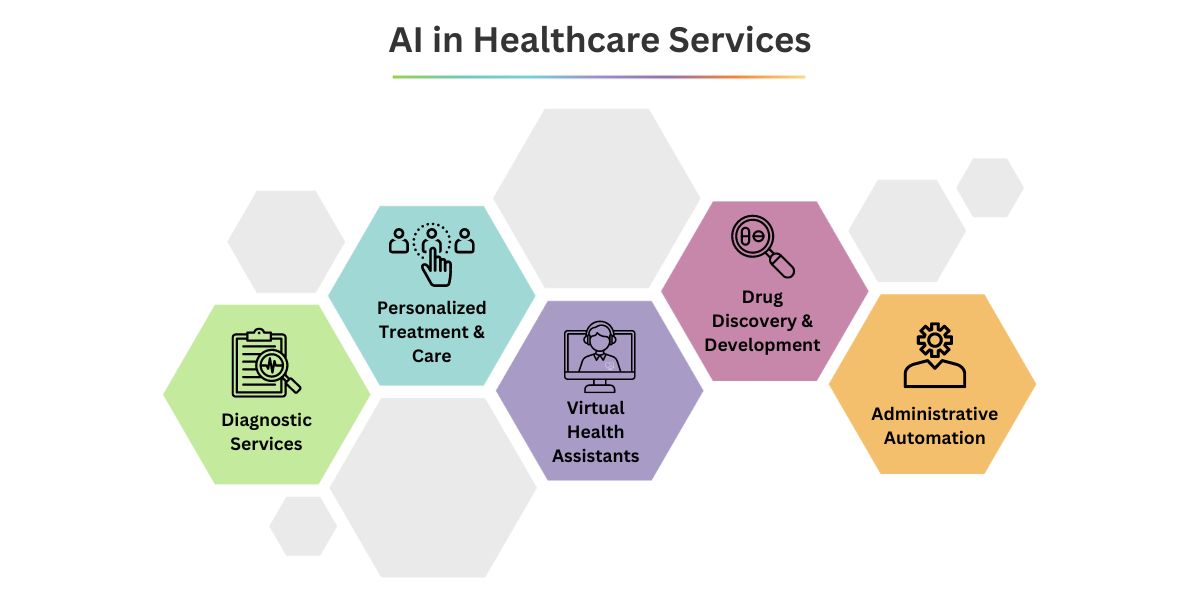
1.Diagnostic Services- AI and its Impact on Healthcare Services
AI-powered diagnostic services have significantly improved the accuracy and efficiency of medical imaging techniques such as X-rays, MRIs, and CT scans. By leveraging deep learning techniques algorithms, AI can analyze vast amounts of imaging data to detect diseases with unprecedented precision.
For instance, in the field of radiology, AI algorithms can identify early signs of cancer, fractures, and other abnormalities, leading to faster diagnoses and better patient outcomes. Furthermore, AI-driven pathology and histology tools are automating the analysis of tissue samples, enabling quicker and more accurate diagnostic insights.
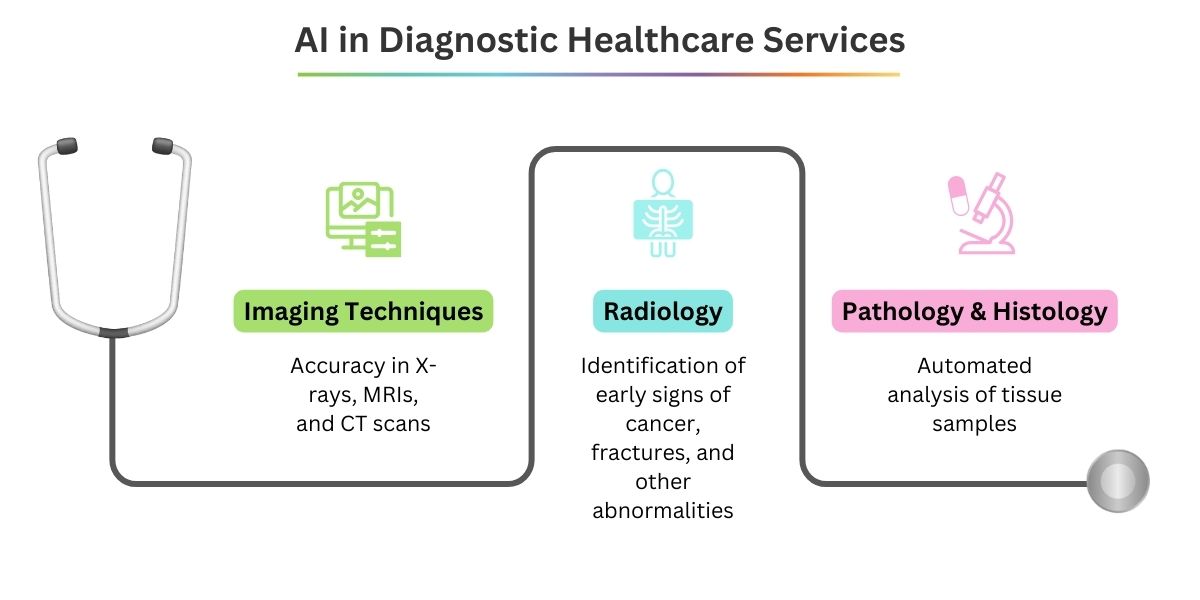
2. Personalized Treatment and Care
One of the most promising applications of AI in healthcare is the personalization of treatment and care plans based on individual patient data.
You may be wondering, how is it even possible? Well, AI algorithms can analyze patient demographics, medical history, genetic information, and lifestyle factors to tailor treatment regimens that are most effective for each patient.
The result? This personalized approach not only improves treatment outcomes but also reduces the risk of adverse reactions and unnecessary interventions. So, flowing with the stream of this systematic treatment and care, the role of AI in the healthcare sector is brighter and better.
In fact, healthcare providers are increasingly adopting AI-driven decision support systems to assist in treatment planning, medication management, and disease management, leading to more efficient and patient-centered care.
3.Virtual Health Assistants
As the world shrinks and processes get easier, it’s tough to oppose the fact that some AI technologies in healthcare are set to replace humans to a large extent.
One such point is how AI-powered virtual health assistants are revolutionizing the way patients access healthcare services and interact with healthcare providers.
How do they do it? These virtual assistants leverage natural language processing and machine learning algorithms to understand patient inquiries, provide medical advice, schedule appointments, and even assist with medication management. By offering convenient access to healthcare information and services, virtual health assistants improve patient engagement, enhance healthcare outcomes, and reduce the burden on healthcare facilities.
Additionally, virtual assistants play a crucial role in expanding access to healthcare services, particularly in rural or underserved areas where access to traditional healthcare facilities may be limited.
So as mind-boggling as it may sound, the reality is that AI applications in healthcare are going to be more reliable in the years to come if done and used right.
4.Drug Discovery and Development
AI has emerged as a powerful tool in drug discovery and development, significantly accelerating the process of bringing new therapies to market. By analyzing vast amounts of biomedical data, AI algorithms can identify potential drug targets, predict drug efficacy and safety profiles, and optimize drug candidates for clinical trials.
Pharmaceutical companies are increasingly leveraging AI-driven approaches to streamline drug discovery pipelines, reduce development costs, and improve the success rate of clinical trials.
Furthermore, AI enables the development of personalized medicine approaches by identifying patient subpopulations that are most likely to benefit from specific treatments, leading to more targeted and effective therapies.
5.Administrative Automation
In addition to clinical applications, AI is also transforming administrative tasks within the healthcare sector, such as billing, scheduling, and medical record documentation.
AI-driven administrative solutions automate repetitive tasks, streamline workflows, and reduce the likelihood of errors, thereby improving efficiency and reducing the administrative burden on healthcare professionals.
By freeing up time and resources, AI allows healthcare providers to focus more on patient care, ultimately enhancing the quality and delivery of healthcare services.
Ethical and Regulatory Considerations of AI in the Healthcare Industry
Despite the tremendous potential of AI in healthcare, it also raises important ethical and regulatory considerations that must be addressed.
These include concerns related to data privacy, algorithm bias, and the potential displacement of healthcare workers. It is essential to establish robust regulatory frameworks and industry standards to ensure the responsible and ethical use of AI technologies in healthcare.
Additionally, healthcare organizations must prioritize transparency, accountability, and fairness in the development and deployment of AI-driven solutions to build trust with patients and stakeholders.
Future Trends and Opportunities
Looking ahead, the future of AI in healthcare holds immense promise, with emerging trends such as the integration of genomics data, wearable devices, and real-time health monitoring poised to revolutionize healthcare delivery.
AI-powered technologies will continue to play a central role in driving innovation, improving patient outcomes, and advancing the practice of medicine. By embracing these opportunities and fostering collaboration between stakeholders, we can harness the full potential of AI to address healthcare challenges and improve the quality and accessibility of healthcare services for all.
Final Note
In conclusion, the role of AI in the healthcare sector is transformative, offering unprecedented opportunities to improve patient care, enhance healthcare outcomes, and optimize healthcare delivery.
From diagnostic services and personalized treatment to administrative automation and virtual health assistants, AI-powered technologies are reshaping every aspect of healthcare.
However, to realize the full potential of AI in healthcare, it is crucial to address ethical and regulatory considerations, prioritize transparency and accountability, and foster collaboration across the healthcare ecosystem. By doing so, we can unlock the transformative power of AI to build a healthier and more equitable future for all.
Looking to discover the magic of AI in healthcare and beyond? Reach out to us and our team of experienced AI enthusiasts at AIT Global would be pleased to help you integrate the wonders of AI in the operations of your venture!

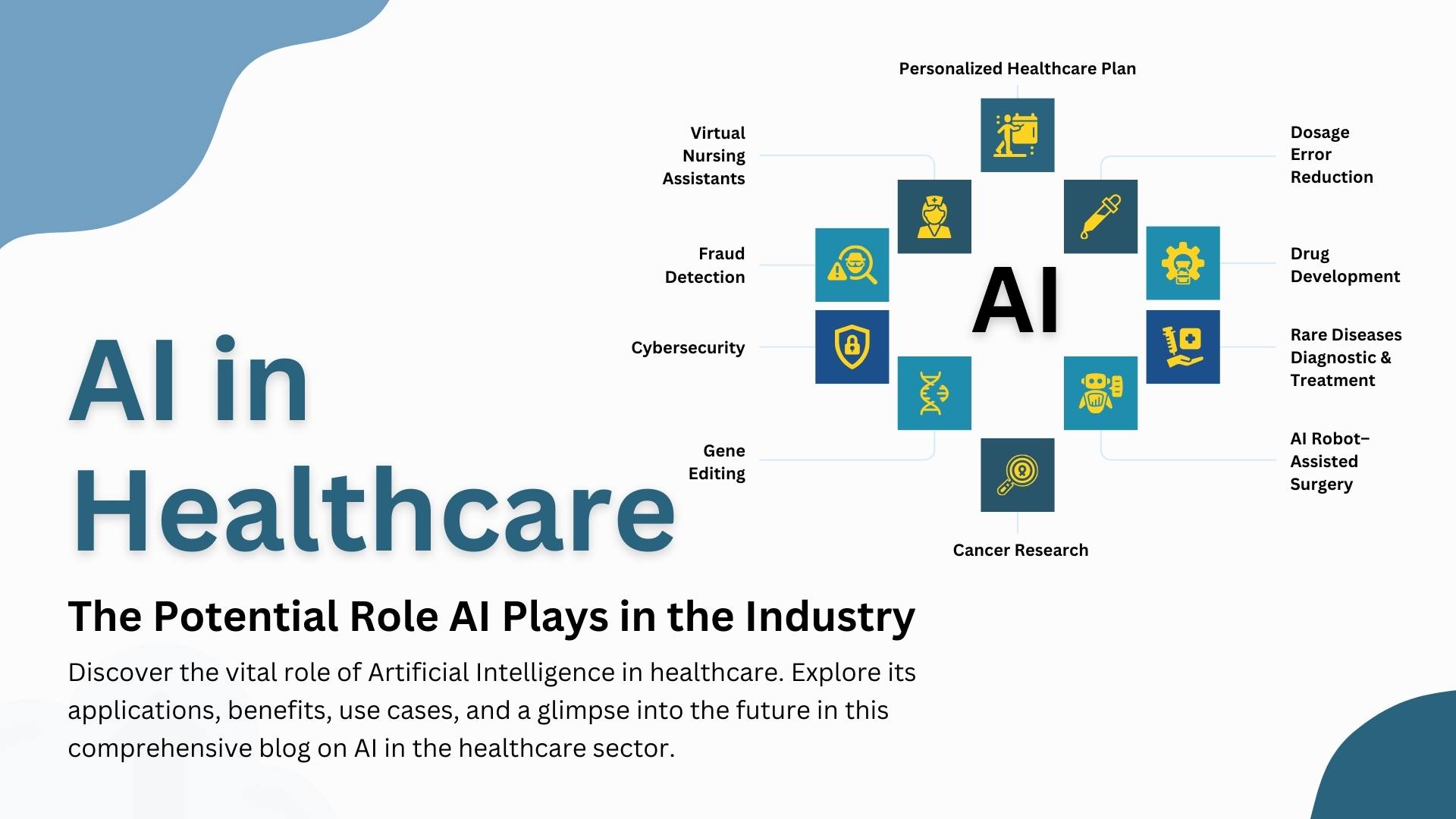





 What is XBRL: Learn the Definition, its Benefits, and Trends
What is XBRL: Learn the Definition, its Benefits, and Trends 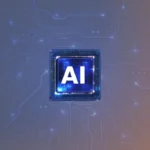 Agentic AI vs Generative AI: What’s the Difference and Why It Matters
Agentic AI vs Generative AI: What’s the Difference and Why It Matters  The Hidden Costs of Incorrect EDGAR Filing and XBRL Tagging – And How to Avoid Them
The Hidden Costs of Incorrect EDGAR Filing and XBRL Tagging – And How to Avoid Them 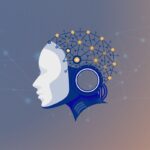 What is Agentic AI and How It’s Transforming Business Operations
What is Agentic AI and How It’s Transforming Business Operations  AI Tools For Small Businesses
AI Tools For Small Businesses